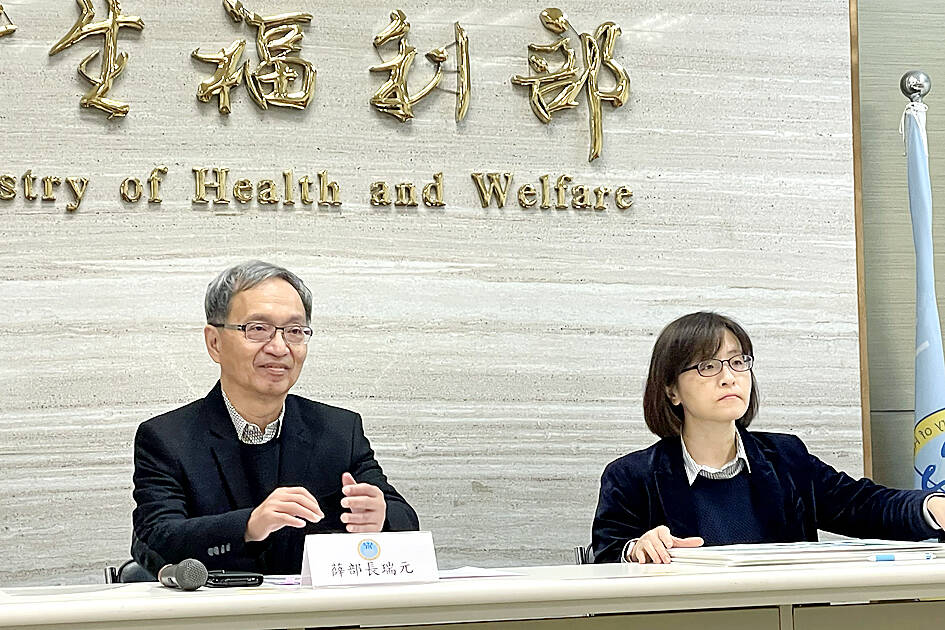New regulations expanding the scope of telemedicine and the issuance of prescriptions are to take effect on July 1, which are expected to benefit millions of people, the Ministry of Health and Welfare said yesterday.
The ministry has amended the Rules of Medical Diagnosis and Treatment by Telecommunications (通訊診察治療辦法) that would add five special circumstances in which telemedicine would be allowed, as well as ease the rules on issuing prescriptions and expanding the types of healthcare services provided through telecommunications.
According to Article 11 of the Physicians Act (醫師法), physicians may not treat or issue prescriptions or a certificate of diagnosis to people they have not examined in person, Minister of Health and Welfare Hsueh Jui-yuan (薛瑞元) said. However, they may use telemedicine to treat people residing in certain areas (such as mountainous or remote areas) or under special or urgent circumstances, Hsueh added.

Photo: Chiu Chih-jou, Taipei Times
As telemedicine became more widely used during the COVID-19 pandemic and is becoming a new normal for healthcare, regulations have been carefully modified to expand the special circumstances in which it might be used, he said, adding that it is expected to benefit up to 2.47 million people.
The five new special circumstances cover patients in a chronic care program, under hospice care, institutionalized at correction agencies, under disability care or under care for illness or injury from a disaster, infectious disease or other major incidents, Department of Medical Affairs Director-General Liu Yueh-ping (劉越萍).
These would bring the total number of circumstances eligible for receiving telemedicine to 10.
However, not all patients in any of the 10 circumstances are directly eligible for telemedicine, Hsueh said.
They must also be included in one of two categories: programs approved by the local health department and National Health Insurance (NHI) bundled payment programs.
“This means that when healthcare facilities want to provide telemedicine to patients under special circumstances, they must write a proposal and obtain approval” from the competent authority, he said. “It does not mean every patient who fall under any of the 10 special circumstances can directly book a telemedicine appointment with a doctor.”
Physicians who use telemedicine on patients who do not meet these qualifications may be fined between NT$20,000 and NT$100,000 for breaching the Physicians Act, Hsueh said.
The amendments would also allow physicians to issue prescriptions through telecommunication methods under certain conditions, and expand the types of healthcare services they can provide, including medical consultation, physician-to-physician consultation, psychotherapy, and issuing examination and check-up sheets, Liu said.
Asked why the draft amendments were announced last year, but it took almost a year for the ministry to announce their formal implementation, Hsueh said that some clinics expressed concern that the changes would encourage people to ditch clinics in favor of telemedicine consultation in hospitals.
However, clinics have since accepted the changes, as only clinics can provide healthcare services from the NHI bundled payment programs, such as the home-based medical integration program and the family physician care program, he added.
To prepare for the implementation of the amendments on July 1, the ministry is preparing and working on supplementary measures, including the digital NHI card system, e-prescription system, drug delivery method and information security verification standards.

CHAOS: Iranians took to the streets playing celebratory music after reports of Khamenei’s death on Saturday, while mourners also gathered in Tehran yesterday Iranian Supreme Leader Ayatollah Ali Khamenei was killed in a major attack on Iran launched by Israel and the US, throwing the future of the Islamic republic into doubt and raising the risk of regional instability. Iranian state television and the state-run IRNA news agency announced the 86-year-old’s death early yesterday. US President Donald Trump said it gave Iranians their “greatest chance” to “take back” their country. The announcements came after a joint US and Israeli aerial bombardment that targeted Iranian military and governmental sites. Trump said the “heavy and pinpoint bombing” would continue through the week or as long

TRUST: The KMT said it respected the US’ timing and considerations, and hoped it would continue to honor its commitments to helping Taiwan bolster its defenses and deterrence US President Donald Trump is delaying a multibillion-dollar arms sale to Taiwan to ensure his visit to Beijing is successful, a New York Times report said. The weapons sales package has stalled in the US Department of State, the report said, citing US officials it did not identify. The White House has told agencies not to push forward ahead of Trump’s meeting with Chinese President Xi Jinping (習近平), it said. The two last month held a phone call to discuss trade and geopolitical flashpoints ahead of the summit. Xi raised the Taiwan issue and urged the US to handle arms sales to

A magnitude 5.6 earthquake struck off the coast of Yilan County at 12:37pm today, with clear shaking felt across much of northern Taiwan. There were no immediate reports of damage. The epicenter of the quake was 16.9km east-southeast of Yilan County Hall offshore at a depth of 66.8km, Central Weather Administration (CWA) data showed. The maximum intensity registered at a 4 in Yilan County’s Nanao Township (南澳) on Taiwan’s seven-tier scale. Other parts of Yilan, as well as certain areas of Hualien County, Taipei, New Taipei City, Taoyuan, Hsinchu County, Taichung and Miaoli County, recorded intensities of 3. Residents of Yilan County and Taipei received

Taiwan has secured another breakthrough in fruit exports, with jujubes, dragon fruit and lychees approved for shipment to the EU, the Ministry of Agriculture said yesterday. The Animal and Plant Health Inspection Agency on Thursday received formal notification of the approval from the EU, the ministry said, adding that the decision was expected to expand Taiwanese fruit producers’ access to high-end European markets. Taiwan exported 126 tonnes of lychees last year, valued at US$1.48 million, with Japan accounting for 102 tonnes. Other export destinations included New Zealand, Hong Kong, the US and Australia, ministry data showed. Jujube exports totaled 103 tonnes, valued at